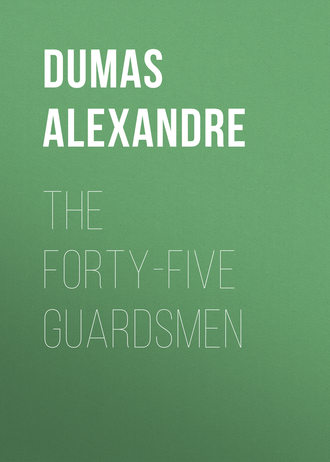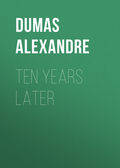
Александр Дюма
The Forty-Five Guardsmen
"M. de Mornay, who does not jest with disobedience, M. Chicot."
Chicot put his hand to his sword, but another look showed him that the outside of the gate was defended by a guard who would have prevented his passing if he had killed the officer and sentinel.
"Well!" said Chicot to himself, with a sigh; "I have lost my game," and he turned back.
"Shall I give you an escort, M. Chicot?" said the officer.
"No, thank you."
Chicot retraced his steps, but he was not at the end of his griefs. He met the chief of the watch, who said, "What! have you finished your commission already, M. Chicot? Peste! how quick you are!"
A little further on the cornet cried to him, "Well, M. Chicot, what of the lady; are you content with Nerac?"
Finally, the soldier in the courtyard said, "Cordieu! M. Chicot, the tailor has not done his work well; you seem more torn than when you went out."
Chicot did not feel inclined to climb back through the window: but by chance, or rather by charity, the door was opened, and he returned into the palace. Here he saw the page, who said, "Dear M. Chicot, shall I give you the key to all this?"
"Yes, serpent," murmured Chicot.
"Well! the king loves you so much, he did not wish to lose you."
"And you knew, and never told me?"
"Oh! M. Chicot, impossible! It was a state secret."
"But I paid you, knave."
"Oh! dear M. Chicot, the secret was worth more than ten pistoles."
Chicot returned to his room in a rage.
CHAPTER LII.
HOW THEY HUNTED THE WOLF IN NAVARRE
When Marguerite left the king, she went at once to the apartments of the maids of honor, and performed her promise with regard to Fosseuse. When she returned, the king thanked her warmly, and then went up to Chicot's room, where he found him still asleep. Henri shook him to wake him. "Come, compere," said he, "get up, it is two in the morning."
"Ah! you make me a prisoner," cried Chicot; "I, an ambassador. Sire, you violate the rights of nations."
Henri began to laugh, and Chicot could not help joining him.
"You are mad," said Henri. "Why the devil did you want to go away from here, have you not been well treated?"
"Too well, ventre de biche! too well. It seems to me as if I were like a goose being fattened. Every one says to me, 'Pretty little Chicot, how gentle he is!' but they clip my wings, and shut the doors on me."
"Oh! reassure yourself, Chicot; you are not fat enough for my table."
"Sire, you seem very gay this morning; what is it?"
"I am always gay when I am setting off for the chase. Come, out of bed, compere."
"You want me, sire?"
"Yes; you shall be my historian."
"To count the shots?"
"Just so."
Chicot dressed murmuringly, while the king remained in the antechamber.
"My horse," cried Henri; "and tell M. de Mornay that I am ready."
"What! is M. de Mornay chief huntsman?" asked Chicot.
"M. de Mornay is everything here," replied Henri. "I am so poor, than I can afford but one man."
"Yes; but he is a good one."
Chicot found the preparations much less sumptuous than those of Henri III. A dozen or fifteen gentlemen only, among whom he recognized the Vicomte de Turenne, formed the whole suite. And as they were none of them rich, they all wore, instead of the usual hunting dress, their helmets and cuirasses, which made Chicot ask if the wolves in Gascony used muskets and artillery.
"No," said Henri; "but they are fierce beasts, who have claws and teeth, and draw hunters into places where they are likely to tear their clothes on the thorns, if they wear silk and velvet, or even cloth and buff, but not if they wear cuirasses."
"That is a reason, but not a good one, sire."
"What would you have? I have no other."
"Then I must be content with this."
"You had better."
"So be it."
"You are angry at being disturbed for this chase."
"Ma foi! yes."
"So you find fault?"
"Is it forbidden?"
"Oh no."
"You understand, sire, I am no hunter, and have nothing to do, so I must amuse myself, while you are thinking of all the wolves that a dozen men are going to kill."
"Ah, yes, laugh away, Chicot; first it was the clothes, now the number of wolves."
"Oh, sire!"
"But I must say you are not indulgent, for Béarn is not as large as France; so the king goes there with two hundred huntsmen, I with a dozen, as you see."
"Yes, sire."
"But," said Henri, "sometimes the country gentlemen, hearing I am going, quit their chateaux and join me, which sometimes makes up a good escort for me."
When they had ridden about half an hour —
"Look," said Henri to Chicot, "are not those cavaliers that I see there?"
Chicot looked and said, "Yes, sire, cavaliers, but not huntsmen."
"Why not?"
"Because they are armed like Amadis or Rolando," replied Chicot.
"Ah! what matters the dress, my dear Chicot? you see we are not particular as to that."
"But I see at least two hundred men there."
"Ah! that is a good number."
Chicot began to feel very curious. He had really named too low a number, for the group before them consisted of two hundred men, who came silently and joined their party; each man was well armed and mounted, and they were led by a gentleman who came and kissed Henri's hand with much devotion.
They passed the river Gers, and then came on a second troop of one hundred men; the chief approached, and seemed to be making excuses for not bringing more men. Henri gave him his hand. They went on till they came to the Garonne; this they also passed, and about half a league on the other side, three hundred cavaliers, hidden in a pine forest, suddenly came in sight.
"Oh! monseigneur," said Chicot, "are not these enemies who have heard of your chase, and wish to oppose it?"
"No, my son, you are wrong; they are friends from Puzmirol."
"Mordieu! sire, you will have more men in your escort than trees in your forest."
"Chicot, I really believe the news of your arrival must have spread through the country, and all these people have come to welcome the ambassador from France."
Chicot saw he was being laughed at, and felt rather offended.
The day finished at Muroy, where the gentlemen of the country gave a grand supper to the king, of which Chicot took his part enthusiastically, as it had not been deemed necessary to stop on the road for anything so unimportant as dinner, and he had eaten nothing since he had left Nerac.
Henri had the best house in the town, half the troop slept within doors, the other half in the street where the king was.
"When are we to begin the hunt?" asked Chicot of Henri, as he was undressing.
"We are not yet in the territory of the wolves, my dear Chicot."
"And when shall we be?"
"Curious!"
"Not so, sire; but you understand, one likes to know where one is going."
"You will know to-morrow; meanwhile, lie down there on those cushions on my left; here is Mornay snoring already at my right."
"Peste!" said Chicot, "he makes more noise asleep than awake."
"It is true he is not very talkative; but see him at the chase."
Day had partly appeared, when a great noise of horses awoke Chicot. They dressed, drank some spiced wine, and took other refreshment, and then Henri cried:
"To horse! gentlemen, we have a long day's work before us."
Chicot saw with astonishment that five hundred cavaliers had swelled the train during the night.
"Sire!" cried he, "you have an army."
"Wait!" replied Henri.
At Lauzerte, six hundred more men came and ranged themselves behind the cavaliers.
"Foot soldiers!" cried Chicot.
"Nothing but beaters," said the king.
Chicot frowned and spoke no more.
Twenty times his eyes turned toward the country, and the idea of flight presented itself to him. But Chicot had his guard of honor, doubtless as ambassador of the king of France, and so well was he recommended to this guard, that he could not make a movement that was not repeated by ten men.
This annoyed him, and he said so to the king.
"Diable!" said Henri, "it is your own fault; you tried to run away from Nerac, and I am afraid you will try it again."
"Sire, if I give my word as a gentleman not to do so?"
"That will do."
"Besides, I should be wrong to do so."
"How so?"
"Yes; for if I stay, I believe I shall see curious things."
"I am of your opinion, my dear Chicot."
At this moment they were going through the town of Montcuq, and four field-pieces took their place in the army.
"I return to my first idea," said Chicot, "that the wolves in this country are different from others, and are differently treated; with artillery, for instance."
"Ah!" said Henri, "it is a mania of the people of Montcuq. Since I gave them these four pieces they take them about everywhere."
"Well, sire, shall we arrive to-day?"
"No, to-morrow."
"To-morrow morning or evening?"
"Morning."
"Then," said Chicot, "it is at Cahors we are to hunt, is it not, sire?"
"On that side," replied Henri.
"But, sire, you who have infantry, cavalry, and artillery to hunt wolves with, should also have taken the royal standard, and then the honor to the wolves would have been complete."
"We have not forgotten it, Chicot, ventre St. Gris! only it is left in the case for fear of dirtying it. But if you wish to see it, and know under whose banner you march, you shall see it."
"No, no, it is useless; leave it where it is."
"Well, be easy, you will see it before long."
They passed the second night at Catus. Troops kept arriving all night.
"It is lucky we are not going on to Paris," said Chicot, "we should arrive with 100,000 men."
The next morning, by eight o'clock, they were before Cahors, with 1,000 foot soldiers and 2,000 horse.
They found the city in a state of defense, M. de Vezin having heard rumors of the advance.
"Ah!" said the king, "he is warned; that is very annoying."
"We must lay siege in due form, sire," said Mornay; "we expect still about 2,000 men, and that is enough."
"Let us assemble the council and begin the trenches."
Chicot listened to all this in amazement. The pensive air of Henri alone reassured him, for it confirmed his suspicions that he was no warrior. He let every one speak, and said nothing. All at once he raised his head, and said in a commanding tone:
"Gentlemen, this is what we must do. We have 3,000 men, and you say you expect 2,000 more, Mornay?"
"Yes, sire."
"That will make 5,000. In a regular siege we should lose 1,000 or 1,500 men in two months, their death would discourage the others, and we should lose 1,000 more in retreating. Let us sacrifice 500 men at once, and take Cahors by assault."
"What do you mean, sire?" asked Mornay.
"My dear friend, we will go straight to the nearest gate. We shall find a fosse in our way, which we will cover with fascines; we may leave two hundred men on the road, but we shall reach the gate."
"After, sire?"
"Then we will break it down with petards and go in. It will not be difficult."
Chicot looked at Henri, astonished.
"Oh!" growled he, "perhaps he is a coward and a boaster."
"Let us not lose time, gentlemen," cried Henri. "Forward, and let all who love me follow."
Chicot approached Mornay.
"Well! M. le Comte," said he, "do you all want to be cut to pieces?"
"Oh! we take our chance."
"But the king will get killed."
"Bah! he has a good cuirass."
"But he will not be foolish enough to fight himself, I suppose?"
Mornay shrugged his shoulders and turned on his heel.
"After all, I like him better asleep than awake; he is more polite snoring than speaking," said Chicot.
CHAPTER LIII.
HOW HENRI OF NAVARRE BEHAVED IN BATTLE
The little army advanced near the town, then they breakfasted. The repast over, two hours were given for the officers and men to rest. Henri was very pale, and his hands trembled visibly, when at three o'clock in the afternoon the officers appeared under his tent.
"Gentlemen," said he, "we are here to take Cahors; therefore we must take it – by force. Do you understand? M. de Biron, who has sworn to hang every Huguenot, is only forty-five leagues from here, and doubtless a messenger is already dispatched to him by M. de Vezin. In four or five days he will be on us, and as he has 10,000 men with him, we should be taken between the city and him. Let us, then, take Cahors before he comes, that we may receive him well. Come, gentlemen, I will put myself at your head, and let the blows fall as thick as hail."
The men replied to this speech by enthusiastic cries.
"Well said," said Chicot to himself. "It was lucky he had not to speak with his hands, though, or he would have stammered finely. Let us see him at the work."
As they were setting off, the king said to Chicot:
"Pardon me, friend Chicot, I deceived you by talking of wolves, hunting, and such things, but you see Henri will not pay me his sister's dowry, and Margot cries out for her dear Cahors. One must do what one's wife wants, for peace' sake; therefore I am going to try and take Cahors."
"Why did she not ask you for the moon, sire, as you are such a complaisant husband?"
"I would have tried for it, Chicot, I love my dear Margot so much!"
"You will have quite enough to do with Cahors, and we shall see how you will get out of it."
"Ah! yes, the moment is critical and very disagreeable. Ah! I am not brave, and my nature revolts at every cannonade. Chicot, my friend, do not laugh too much at the poor Béarnais, your compatriot and friend. If I am afraid and you find it out, tell no one."
"If you are afraid?"
"Yes."
"Are you, then, afraid of being afraid?"
"I am."
"But then, ventre de biche, why the devil do you undertake such a thing?"
"I must."
"M. de Vezin is a terrible person."
"I know it well."
"Who gives quarter to no one."
"You think so, Chicot?"
"I am sure of it; red plume or white, he will not care, but cry, Fire!"
"You say that for my white feather, Chicot."
"Yes, sire, and as you are the only one who wears that color – "
"Well!"
"I would take it off."
"But I put it on that I might be recognized."
"Then you will keep it?"
"Yes, decidedly." And Henri trembled again as he said it.
"Come, sire," said Chicot, who did not understand this difference between words and gestures, "there is still time; do not commit a folly; you cannot mount on horseback in that state."
"Am I, then, very pale, Chicot?"
"As pale as death, sire."
"Good."
"How good?"
At this moment the noise of cannon and a furious fire of musketry was heard; it was M. de Vezin's reply to the summons to surrender given by Mornay.
"Hem!" said Chicot, "what do you think of this music, sire?"
"It makes me cold in the marrow of my bones," replied Henri. "Here, my horse! my horse!" cried he.
Chicot looked and listened, unable to understand him. Henry mounted, and then said —
"Come, Chicot, get on horseback too; you are not a warrior, either, are you?"
"No, sire."
"Well, come, we will be afraid together; come and see, my friend. A good horse here, for M. Chicot."
Henri set off at full gallop, and Chicot followed him. On arriving in front of his little army, Henri raised his visor, and cried:
"Out with the banner! out with the new banner!"
They drew forth the banner, which had the double scutcheon of Navarre and Bourbon; it was white, and had chains of gold on one side, and fleur-de-lis on the other.
Again the cannon from Cahors were fired, and the balls tore through a file of infantry near the king.
"Ventre St. Gris! did you see, Chicot?" said the king, whose teeth chattered.
"He will be ill," thought Chicot.
"Cursed body," murmured Henri, "ah! you fear, you tremble; wait till you have something to tremble for." And striking his spurs into his horse, he rushed onward before cavalry, infantry, and artillery, and arrived at a hundred feet from the place, red with the fire of the batteries which thundered from above. There, he kept his horse immovable for ten minutes, his face turned toward the gate of the city, and crying, "The fascines! ventre St. Gris! the fascines!"
Mornay had followed him, sword in hand, and then came Chicot; behind them the young Huguenot gentlemen, crying, "Vive Navarre!" and each with a fascine, which he threw in, and the fosse was soon filled. Then came the artillery, and with the loss of thirty men succeeded in placing their petards under the gate. The shot whistled like a whirlwind of iron round Henri's head, and twenty men fell in an instant before his eyes. "Forward!" cried he, and rushed on through the midst of the fire, and arrived just as the soldiers had fired the first petard. The gate was broken in two places; the second petard was lighted, and a new opening was made in the wood; but twenty arquebuses immediately passed through, vomiting balls on the soldiers and officers, and the men fell like mowed grass.
"Sire," cried Chicot, "in Heaven's name retire!"
Mornay said nothing; he was proud of his pupil, but from time to time he tried to place himself before him. Once Henri felt the damp on his brow, and a cloud pass over his eyes.
"Ah, cursed nature," cried he, "you shall not conquer me!" Then, jumping off his horse, "An ax!" cried he, and with a vigorous arm he struck down wood and iron. At last a beam gave way, and a part of the gate and a portion of the wall fell, and one hundred men rushed to the breach, crying, "Navarre! Navarre! Cahors is ours!"
Chicot had not quitted the king; he was with him under the gate when he entered, one of the first, but at each discharge he saw him shudder and lower his head.
"Ventre St. Gris! did you ever see such a coward, Chicot?" said he.
"No, sire, I have never seen a coward like you."
The soldiers of M. de Vezin now tried to dislodge Henri and his advanced guards, who received them sword in hand; but the besieged were the strongest, and succeeded in forcing Henri and his troops back beyond the fosse.
"Ventre St. Gris!" cried the king, "I believe my flag retreats; I must carry it myself." And snatching it from the hands of those who held it, he was the first to rush forward again, half enveloped in its folds. The balls whistled round him, and pierced the flag with a hollow sound. A long hand-to-hand fight ensued, above all the uproar of which M. de Vezin's voice was heard crying, "Barricade the streets! let trenches be dug! and the houses garrisoned!"
"Oh!" cried M. de Turenne, "the siege of the city is over, Vezin." And as he spoke he fired at him and wounded him in the arm.
"You are wrong, Turenne," cried M. de Vezin, "there are twenty sieges in Cahors; so if one is over, there are nineteen to come."
M. de Vezin defended himself during five days and nights from street to street and from house to house. Luckily for the rising fortunes of Henri of Navarre, he had counted too much on the walls and garrison of Cahors, and had neglected to send to M. de Biron.
During these five days and nights, Henri commanded like a captain and fought like a soldier, slept with his head on a stone, and awoke sword in hand. Each day they conquered a street or a square, which each night the garrison tried to retake. On the fourth night the enemy seemed willing to give some rest to the Protestant army. Then it was Henri who attacked in his turn. He forced an intrenched position, but it cost him seven hundred men. M. de Turenne and nearly all the officers were wounded, but the king remained untouched. To the fear that he had felt at first, and which he had so heroically vanquished, succeeded a feverish restlessness, a rash audacity. All the fastenings of his armor were broken, as much by his own efforts as by the blows of the enemy. He struck so vigorously that he always killed his man. When this last post was forced, the king entered into the inclosure, followed by the eternal Chicot, who, silent and sad, had for five days seen growing at his sides the phantom of a monarchy destined to destroy that of the Valois.
"Well, Chicot, of what are you thinking?" said Henri to him.
"Sire, that you are a real king."
"And I, sire, that you are too imprudent," said Mornay, "to put up your vizor when they are firing at you from all sides."
As he spoke a dozen arquebuses were fired at them; one ball struck off a plume from Henri's helmet, his horse was killed by another, and Mornay's had his leg broken. The king fell, and there might have finished his career; but Chicot, whirling his sword round to keep off the nearest, helped Henri up and gave him his own horse, saying, "Sire, you will testify to the king of France that, if I drew the sword against him, I killed no one." – "Ventre St. Gris! you must be mine, Chicot!" cried Henri. "You shall live and die with me."
"Sire, I have but one service to follow – that of my king. His star diminishes, but I shall be faithful to his adverse fortunes. Let me serve and love him as long as I live, sire. I shall soon be alone with him; do not envy him his last servant."
"Chicot, you will be always dear to me, and, after Henri of France, you will have Henri of Navarre for a friend."
"Yes, sire," said Chicot simple, kissing his hand.
The siege was soon over after this. M. de Vezin was taken, and the garrison surrendered.
Then Henri dictated to Mornay a letter, which Chicot was to carry to the king of France. It was written in bad Latin, and finished with these words:
"Quod mihi dixisti profuit multum. Cognosco meos devotos; nosce tuos. Chicotos cætera expedit."
Which means, "What you told me was very useful. I know my faithful followers; know yours. Chicot will tell you the rest."
"And now, friend Chicot," said Henri, "embrace me; but take care not to soil yourself, for, mordieu, I am as bloody as a butcher. Take my ring, and adieu, Chicot; I keep you no longer, gallop to France, and tell all you have seen."







